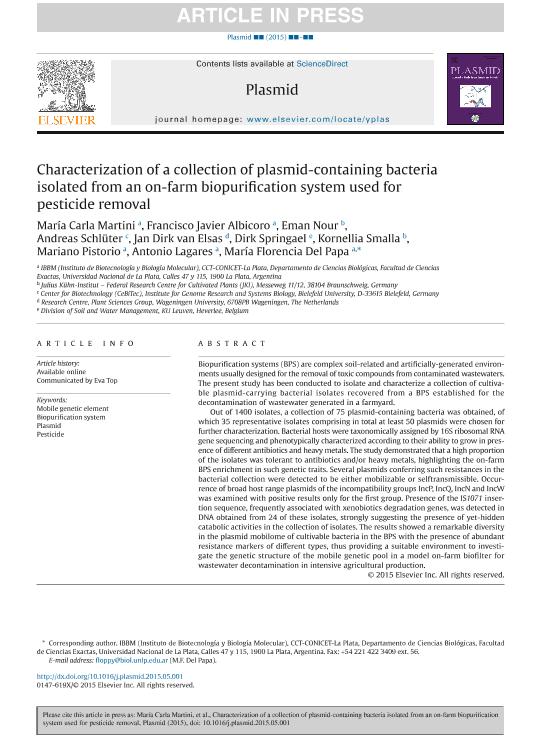Mostrar el registro sencillo del ítem
dc.contributor.author
Martini, María Carla

dc.contributor.author
Albicoro, Francisco Javier

dc.contributor.author
Nour, Eman
dc.contributor.author
Schlüter, Andreas
dc.contributor.author
van Elsas,Jan Dirk
dc.contributor.author
Springael, Dirk
dc.contributor.author
Smalla, Kornelia
dc.contributor.author
Pistorio, Mariano

dc.contributor.author
Lagares, Antonio

dc.contributor.author
del Papa, Maria Florencia

dc.date.available
2018-06-08T20:09:14Z
dc.date.issued
2015-07
dc.identifier.citation
Martini, María Carla; Albicoro, Francisco Javier; Nour, Eman; Schlüter, Andreas; van Elsas,Jan Dirk; et al.; Characterization of a collection of plasmid-containing bacteria isolated from an on-farm biopurification system used for pesticide removal; Academic Press Inc Elsevier Science; Plasmid; 80; 7-2015; 16-23
dc.identifier.issn
0147-619X
dc.identifier.uri
http://hdl.handle.net/11336/47983
dc.description.abstract
Biopurification systems (BPS) are complex soil-related and artificially-generated environmentsusually designed for the removal of toxic compounds from contaminatedwastewaters.The present study has been conducted to isolate and characterize a collection of cultivableplasmid-carrying bacterial isolates recovered from a BPS established for thedecontamination of wastewater generated in a farmyard.Out of 1400 isolates, a collection of 75 plasmid-containing bacteria was obtained, ofwhich 35 representative isolates comprising in total at least 50 plasmids were chosen forfurther characterization. Bacterial hosts were taxonomically assigned by 16S ribosomal RNAgene sequencing and phenotypically characterized according to their ability to grow in presenceof different antibiotics and heavy metals. The study demonstrated that a high proportionof the isolates was tolerant to antibiotics and/or heavy metals, highlighting the on-farmBPS enrichment in such genetic traits. Several plasmids conferring such resistances in thebacterial collection were detected to be either mobilizable or selftransmissible. Occurrenceof broad host range plasmids of the incompatibility groups IncP, IncQ, IncN and IncWwas examined with positive results only for the first group. Presence of the IS1071 insertionsequence, frequently associated with xenobiotics degradation genes, was detected inDNA obtained from 24 of these isolates, strongly suggesting the presence of yet-hiddencatabolic activities in the collection of isolates. The results showed a remarkable diversityin the plasmid mobilome of cultivable bacteria in the BPS with the presence of abundantresistance markers of different types, thus providing a suitable environment to investigatethe genetic structure of the mobile genetic pool in a model on-farm biofilter forwastewater decontamination in intensive agricultural production.
dc.format
application/pdf
dc.language.iso
eng
dc.publisher
Academic Press Inc Elsevier Science

dc.rights
info:eu-repo/semantics/openAccess
dc.rights.uri
https://creativecommons.org/licenses/by-nc-sa/2.5/ar/
dc.subject
Plasmid
dc.subject
Biopurification System
dc.subject
Resistance
dc.subject
Mobile Genetic Element
dc.subject.classification
Otras Ciencias Biológicas

dc.subject.classification
Ciencias Biológicas

dc.subject.classification
CIENCIAS NATURALES Y EXACTAS

dc.title
Characterization of a collection of plasmid-containing bacteria isolated from an on-farm biopurification system used for pesticide removal
dc.type
info:eu-repo/semantics/article
dc.type
info:ar-repo/semantics/artículo
dc.type
info:eu-repo/semantics/publishedVersion
dc.date.updated
2018-06-08T14:25:27Z
dc.journal.volume
80
dc.journal.pagination
16-23
dc.journal.pais
Estados Unidos

dc.description.fil
Fil: Martini, María Carla. Consejo Nacional de Investigaciones Científicas y Técnicas. Centro Científico Tecnológico Conicet - La Plata. Instituto de Biotecnología y Biología Molecular. Universidad Nacional de La Plata. Facultad de Ciencias Exactas. Instituto de Biotecnología y Biología Molecular; Argentina
dc.description.fil
Fil: Albicoro, Francisco Javier. Consejo Nacional de Investigaciones Científicas y Técnicas. Centro Científico Tecnológico Conicet - La Plata. Instituto de Biotecnología y Biología Molecular. Universidad Nacional de La Plata. Facultad de Ciencias Exactas. Instituto de Biotecnología y Biología Molecular; Argentina
dc.description.fil
Fil: Nour, Eman. Julius Kühn-Institut – Bundesforschungsinstitut für Kulturpflanzen; Alemania
dc.description.fil
Fil: Schlüter, Andreas. Universitat Bielefeld; Alemania
dc.description.fil
Fil: van Elsas,Jan Dirk. University of Agriculture Wageningen; Países Bajos
dc.description.fil
Fil: Springael, Dirk. Katholikie Universiteit Leuven; Bélgica
dc.description.fil
Fil: Smalla, Kornelia. Julius Kühn-Institut – Bundesforschungsinstitut für Kulturpflanzen; Alemania
dc.description.fil
Fil: Pistorio, Mariano. Consejo Nacional de Investigaciones Científicas y Técnicas. Centro Científico Tecnológico Conicet - La Plata. Instituto de Biotecnología y Biología Molecular. Universidad Nacional de La Plata. Facultad de Ciencias Exactas. Instituto de Biotecnología y Biología Molecular; Argentina
dc.description.fil
Fil: Lagares, Antonio. Consejo Nacional de Investigaciones Científicas y Técnicas. Centro Científico Tecnológico Conicet - La Plata. Instituto de Biotecnología y Biología Molecular. Universidad Nacional de La Plata. Facultad de Ciencias Exactas. Instituto de Biotecnología y Biología Molecular; Argentina
dc.description.fil
Fil: del Papa, Maria Florencia. Consejo Nacional de Investigaciones Científicas y Técnicas. Centro Científico Tecnológico Conicet - La Plata. Instituto de Biotecnología y Biología Molecular. Universidad Nacional de La Plata. Facultad de Ciencias Exactas. Instituto de Biotecnología y Biología Molecular; Argentina
dc.journal.title
Plasmid

dc.relation.alternativeid
info:eu-repo/semantics/altIdentifier/doi/http://dx.doi.org/10.1016/j.plasmid.2015.05.001
dc.relation.alternativeid
info:eu-repo/semantics/altIdentifier/url/https://www.sciencedirect.com/science/article/pii/S0147619X15000438
Archivos asociados
